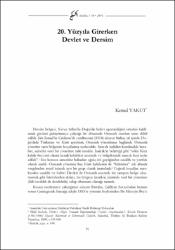20. Yüzyıla girerken devlet ve Dersim
Özet
Osmanlı reformcuları 19. yüzyılda devlet yönetiminde merkeziyetçi yapıyı güçlendirme yönünde düzenlemelere giriştiler. Bu amaçla o zamana kadar vergi ve asker alamadıkları topluluklardan asker ve vergi talebinde bulundular. Osmanlı yönetimi, üzerinde tam bir egemenlik kuramadığı, yöredeki aşiret reisleri ve seyyidlerin kendilerine bir iktidar alanı oluş- turdukları Dersim üzerinde de merkezi yönetimini inşa etmek istedi. Aşiret ilişkilerini tasfiye etme, bu unsurları iskâna zorlama ve iskâna tabi tutulan aşiretleri üretime teşvik ederek vergi gelirlerini arttırma merkezi hükümeti güçlendirmenin başlıca hedefleri arasındaydı. Bu giri- şimler gerilime yol açtı. Askerî harekâtların eşliğinde idarî askerî, iktisadî ve eğitim alanlarında düzenlemeler yoluna gidildi. Aşiretler itaat eden ve etmeyen aşiretler olarak tasnif edildi. Merkezi hükümet yöre halkının büyük çoğunluğunu 'vahşi ve bedevi', bunların inancını da sapkınlık olarak niteledi. İnşa edilen bu dil, devletin hafızasında sürekli tazelendi. Bölgenin 'medenileştirilmesi'ne sürekli vurgu yapıldı. Ottoman reformers embarked on the project of strengthening the central government in the 19th century. To this end, the central government attempted to demand taxes and military service from certain communities which had until then remained outside of the reach of the State. With its tribal structure and the influential community leaders such as chieftains, sheiks and seyyids, Dersim region was one of the core areas for such a policy of centralization and direct control by the imperial administration. The principal goals of the imperial center in its policies towards this region were to diminish the power and authority of these groups over the local population, encourage the nomads and tribes for a sedentary life, and, enlarge the tax basis of the Empire. All these caused disturbance and tension not only among the Dersim tribes themselves but also between the tribes and the state. This article examines the ways in which the imperial administration tried to implement such policies in the region in terms of administrative, military, financial and educational arrangements as well as the military operations. The other emphasis of this study is that the central government labelled most of the population of the region as 'wild', 'Bedouin' and 'deviant' and such a discourse has been reproduced in the official language which was also accompanied by a clear jargon of a 'civilizing mission'.
Kaynak
Kebikeç İnsan Bilimleri İçin Kaynak Araştırmaları DergisiCilt
0Sayı
38Bağlantı
http://www.trdizin.gov.tr/publication/paper/detail/TVRZME5qY3dNQT09https://hdl.handle.net/11421/14186


















